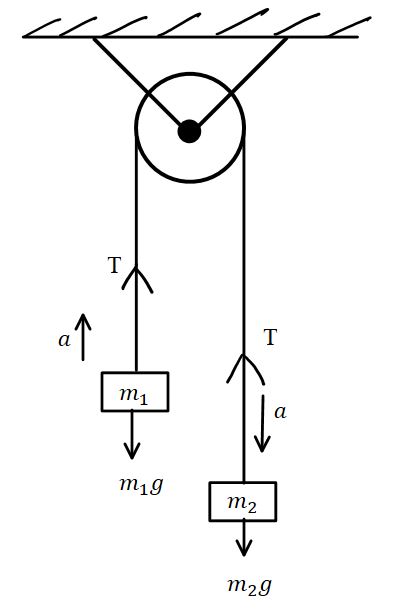•51 GO Figure 5-47 shows two blocks connected by a cord (of negligible mass) that passes over a fric- tionless pulley (also of negligible mass). The arrangement is known as Atwood's machine. One block has mass m¡ = 1.30 kg; the other has mass m2 2.80 kg. What are (a) the magnitude of the blocks' ac- celeration and (b) the tension in the cord? m1
•51 GO Figure 5-47 shows two blocks connected by a cord (of negligible mass) that passes over a fric- tionless pulley (also of negligible mass). The arrangement is known as Atwood's machine. One block has mass m¡ = 1.30 kg; the other has mass m2 2.80 kg. What are (a) the magnitude of the blocks' ac- celeration and (b) the tension in the cord? m1
College Physics
11th Edition
ISBN:9781305952300
Author:Raymond A. Serway, Chris Vuille
Publisher:Raymond A. Serway, Chris Vuille
Chapter1: Units, Trigonometry. And Vectors
Section: Chapter Questions
Problem 1CQ: Estimate the order of magnitude of the length, in meters, of each of the following; (a) a mouse, (b)...
Related questions
Question
51

Transcribed Image Text:•51 GO Figure 5-47 shows two blocks connected by
a cord (of negligible mass) that passes over a fric-
tionless pulley (also of negligible mass). The
arrangement is known as Atwood's machine. One
block has mass m¡ = 1.30 kg; the other has mass m2
2.80 kg. What are (a) the magnitude of the blocks’ ac-
celeration and (b) the tension in the cord?
m1
M2
Expert Solution
Step 1
Given:
mass, m1 = 1.30 kg
mass, m2 = 2.80 kg
Solution:

From the free-body diagram of the system, we get:
From equation 1 and 2 , we get:
Equating equation 3 and 4 , we have:
Substituting the given values in above equation, we get:
Trending now
This is a popular solution!
Step by step
Solved in 2 steps with 1 images

Knowledge Booster
Learn more about
Need a deep-dive on the concept behind this application? Look no further. Learn more about this topic, physics and related others by exploring similar questions and additional content below.Recommended textbooks for you

College Physics
Physics
ISBN:
9781305952300
Author:
Raymond A. Serway, Chris Vuille
Publisher:
Cengage Learning

University Physics (14th Edition)
Physics
ISBN:
9780133969290
Author:
Hugh D. Young, Roger A. Freedman
Publisher:
PEARSON

Introduction To Quantum Mechanics
Physics
ISBN:
9781107189638
Author:
Griffiths, David J., Schroeter, Darrell F.
Publisher:
Cambridge University Press

College Physics
Physics
ISBN:
9781305952300
Author:
Raymond A. Serway, Chris Vuille
Publisher:
Cengage Learning

University Physics (14th Edition)
Physics
ISBN:
9780133969290
Author:
Hugh D. Young, Roger A. Freedman
Publisher:
PEARSON

Introduction To Quantum Mechanics
Physics
ISBN:
9781107189638
Author:
Griffiths, David J., Schroeter, Darrell F.
Publisher:
Cambridge University Press

Physics for Scientists and Engineers
Physics
ISBN:
9781337553278
Author:
Raymond A. Serway, John W. Jewett
Publisher:
Cengage Learning

Lecture- Tutorials for Introductory Astronomy
Physics
ISBN:
9780321820464
Author:
Edward E. Prather, Tim P. Slater, Jeff P. Adams, Gina Brissenden
Publisher:
Addison-Wesley

College Physics: A Strategic Approach (4th Editio…
Physics
ISBN:
9780134609034
Author:
Randall D. Knight (Professor Emeritus), Brian Jones, Stuart Field
Publisher:
PEARSON